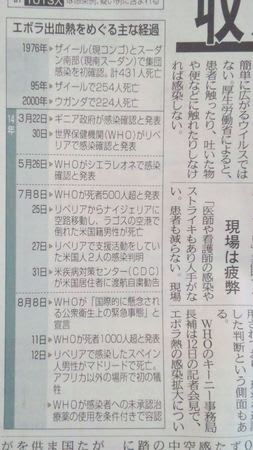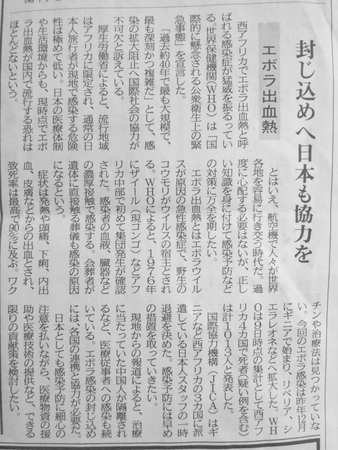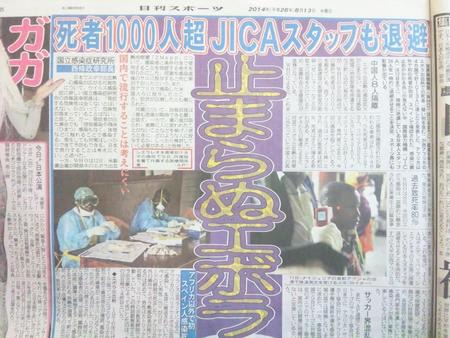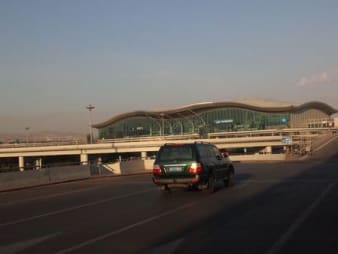Welcome to Okinawa, Madame Ambassador Caroline Kennedy. It is your first visit to Okinawa as the US Ambassador to Japan. Many Okinawans are paying close attention to your visit and the statements you will make.
They are listening closely because they want you to see the real situation here, the real Okinawa that cannot be described in State Department staff briefings or reports from Japanese government officials.
They want you to see USMC Futenma Air Station, located in the heart of the densely populated city of Ginowan. They want you to experience- not from the sky, but with your own feet, your own eyes, your own ears - the ocean at Henoko, in the city of Nago, the proposed location of Futenma’s replacement and designated by our prefectural environmental survey as a Rank 1 site : Urgent Need for Environmental Protection.
In November, 1963, on the day your father, US President John F. Kennedy was assassinated in Dallas, Texas, this island was also enveloped in that sadness.
The red light district of Koza dimmed its neon lights as restaurants and bars closed of their own volition. The following day, at schools and workplaces, many residents grieved in silence the loss of the President.
After being appointed as ambassador to Japan, surely you have learned much about the concerns surrounding the US ? Japan relationship. As you know, the issue of USMC Futenma Air Station has been a huge strain on that relationship in the 18 years since your government and ours pledged to return it to the Okinawan people in 1996.
Why hasn’t the issue been resolved? Please visit Henoko. Talk to the people in the tent village on the seashore who have for years been sitting in protesting the proposed relocation. You will hear the raw voice of Okinawa, far different from the explanations of our governments’ foreign ministers and defense secretaries. You will quickly come to the heart of the problem.
The mayoral election was a clear expression of the will of Nago city. Residents reelected incumbent Susumu Inamine, who said that the relocation of Futenma to Henoko was in direct contradiction with the regional needs of Nago and its residents. In a prefecture wide opinion survey conducted by the Okinawa Times and another news organization at the end of last year, close to 70% of Okinawans expressed opposition to the proposed Henoko relocation. The majority in Okinawa are still opposed to any relocation of Futenma within the prefecture.
During your visit here, you should meet with Mayor Inamine and listen to the reasons why.
You have expressed “deep concern” about the “inhumaneness” of dolphin hunting on Twitter, saying that “the US government opposes dry hunt fisheries”.
The ocean around Henoko is the habitat of the Dugong, an ocean mammal like the dolphin. The Dugong is a Japanese natural monument and the Ministry of Environment has designated it as an endangered species at high risk of extinction.
If the ocean around Henoko is buried, the Dugong will lose their home and their extinction cannot be avoided. To forever lose the Dugong from the planet for the sake of the construction of a military base would be a great detriment to the human race.
The Japanese government has ignored the result of the Nago mayoral election and continued to move forward on the process of burying the ocean at Henoko. To allow the construction of this base to continue in direct opposition to the will of local residents is completely unacceptable in a democratic society.
To attempt to build a new military airbase in Okinawa after the tragedy of the Battle of Okinawa, the 27 long and difficult years of American occupation that followed it, and the disproportionate burden of military bases shouldered by Okinawa since, is nothing but blatant discrimination against the Okinawan people. Please relay these feelings to President Obama.
*******************
[拝啓 ケネディ大使]現地訪ね市長と会談を
沖縄タイムス・社説-2014年2月11日(火)
キャロライン・ケネディさん、ようこそ沖縄へ。駐日米大使として、きょう初めて来県されるんですね。沖縄の多くの人があなたの発言に注目しています。
大使館スタッフのブリーフィングや日本政府関係者の情報からはとらえきれない、この島のありのままの姿を見て考えてもらいたいからです。
宜野湾市の市街地の真ん中にある米軍普天間飛行場。移設先に予定されている名護市辺野古の海は、県の環境保全指針で「自然環境の厳正な保護を図る区域」であるランク1に評価されています。
上空からではなく、自らの足で、目で、耳で確かめてください。
1963年11月、あなたの父ジョン・F・ケネディ大統領がテキサス州ダラスで悲劇に見舞われた日、この島も悲しみに包まれました。
コザの繁華街はネオンを消し、飲食店は営業を自粛しました。哀悼の日には、学校や職場などで多くの住民が黙とうし、哀悼の意を表しました。
駐日米大使としての赴任に当たって日米間のさまざまな懸案について学んだことと思います。普天間問題は、ご存じのように96年の返還合意から18年にわたって、迷走を続けています。
なぜでしょうか。辺野古を訪れ、移設反対を訴えテント村で座り込みを続けている人たちとじかに話してみることです。日米の外務・防衛官僚の説明とは違った沖縄の生の声が聞けるはずです。それによって、この問題の深層に触れることができるでしょう。
■ ■
先の名護市長選で、名護市の民意は示されました。普天間の辺野古移設は地域利益に反するという稲嶺進市長の主張に多くの市民が賛同したのです。
沖縄タイムス社などが昨年末に実施した県民世論調査では、7割近くが辺野古移設に反対でした。沖縄の多数意思は今も、普天間の県内移設に反対しています。
今回の来県で、名護市を訪れ、稲嶺市長と会い、その考えに耳を傾けるべきです。
あなたは短文投稿サイトのツイッターで「米国政府はイルカの追い込み漁に反対します」と表明しました。
辺野古の周辺海域は、イルカと同じ海洋哺乳類ジュゴンの生息域です。ジュゴンは国の天然記念物で環境省は「絶滅の危険性が極めて高い種」に指定しています。
沿岸域が埋め立てられれば、影響は避けられません。基地建設によってジュゴンを失うことは人類にとって大きな損失です。
■ ■
日本政府は、名護市長選の結果を考慮することなく、辺野古の埋め立て工事に向けた手続きを進めています。民主主義を大切にする社会で、地元合意なしに一方的に軍事基地を建設することは許されません。
沖縄戦と27年間の米軍統治、その後も過重な基地負担を背負わされている沖縄に、新たな米軍飛行場を建設するのは「沖縄差別」というしかありません。多くの県民の思いをぜひオバマ大統領に伝えてほしいのです。
Dear US ambassador to Japan Caroline Kennedy
We sincerely welcome you to visit Okinawa. Japan and the United States have faced many challenges in negotiating on the areas of foreign, security, defense and economic policy. However, we hope that you as the US ambassador to Japan will exert your ability with exceptional insight and in the spirit of humanism to reconstruct the US-Japan relationship. We want multi-layered and sustainable relations backed up by mutual trust between both peoples, without overemphasis on military. We have a strong desire to share the universal values of freedom, democracy and mutual respect for basic human rights with American people.
Negative examples
During the 68 years since the end of World War II, the United States has been a teacher of democracy for the people of Okinawa both through positive and negative examples. Young people of the time, who had studied in the United States after the war, praised the democracy. Many of their generations were inspired to become ‘militarism boys’ through education. However, after completing their study in the United States inspired by the hope of democracy, they made use of their knowledge and experience to promote higher education and reconstruct Okinawan society. Meanwhile, it was the United States that captured their land from the residents at Isabama and Iejima “by bulldozers and bayonets” to construct the base in the early postwar period. Such conduct violated Article 46 of the Hague Convention stating that private property cannot be confiscated.
Before the war, people lived their lives in the place where U.S. Marine Corps Futenma Air Station is located. There were schools, a village office and agricultural land. We want the ambassador to understand this abnormal history and accept the reality that the U.S. government operates a military base in an area where it drove out civilians.
The governments of Japan and the United States say they will move forward with the plan to relocate the Futenma base to Henoko, Nago, under an agreement reached in 2006. MV-22 Osprey aircraft plagued with a history of serious accidents will station permanently at the new base and fighter aircraft will regularly use it, if it completed.
Okinawan people are concerned that the human rights, life and property of residents living in the northern region, will forever be compromised as they will be exposed to noise pollution and the risk of an accident.
Believed to be the origin of the mermaid legend, Dugongs live in the sea where coral reefs spread, off the Henoko district. The dugong is listed “1A” as critically endangered in Japanese Red List published by the Ministry of Environment. The US ambassador to Japan tweeted recently, commenting that the U.S. government opposes drive hunt fishing. While most readers responded favorably with grateful hearts to you on Twitter in English, there were many dissenting voices tweeting in Japanese that said dolphin fishing is a part of the life and tradition of residents in their community. You expressed that you were deeply concerned by the inhumaneness of drive hunt dolphin killing. Then is it not inhumane to pose a threat to the habitat of the dugongs by destroying their feeding grounds?
Currently, in your nation and many other regions, American organisations are providing shelter and sanctuary for manatees, which are internationally protected members of the Dugong family. The Fish and Wildlife Conservation Commission helps rescue manatees and transports them to rehabilitation facilities in Florida. They have a network of expert organizations, including biologists, to save manatees. The International Union for Conservation of Nature (IUCN) has made recommendations to protect the dugongs of Henoko three times. We hope you will accept the recommendations to save this endangered species.
Open the door to create new friendship
Ryukyu Shimpo wrote an editorial published on November 24, 1963, to mourn the death of your father, the 35th President of the United States John Fitzgerald Kennedy, after he was tragically killed by an assassin’s bullets. It reads: “President Kennedy struggled mightily to resolve both the international and internal issues such as the Cuban Missile Crisis, the Limited Test Ban Treaty and racial discrimination. He showed his ability to take action, determination and contribution to resolve the problems as the greatest leader of our age with passion and wisdom.” The death of the standard-bearer of the New Frontier spirit was a great shock for the people of Okinawa.
With the sense of responsibility coming from your father, would you open the door to create new friendship between the U.S. and Ryukyu, and put an end to the military colonial rule in Okinawa? We hope that your visit to Okinawa will help change the policy and allow the government to abandon the relocation plan to Henoko and to move the Futenma base outside Okinawa.
(English translation by T&CT)
拝啓 米大使ケネディ様 辺野古断念へ決断の時 沖縄の民主主義尊重を
琉球新報・社説-2014年2月11日(火)
親愛なるキャロライン・ケネディ駐日米国大使へ。あなたの沖縄訪問を心から歓迎します。
日米両国は外交・安全保障や経済分野などで多くの課題を抱えていますが、卓越した見識とヒューマニズムの精神で、日米関係の再構築に手腕を発揮することを期待します。
わたしたちは軍事偏重の日米関係ではなく、両国国民の信頼に裏打ちされた重層的で持続可能な日米関係を望んでいます。
沖縄県民は自由と民主主義、人権の尊重という普遍的価値を米国民と共有したいと望んでいます。米政府は沖縄の民主主義を尊重していますか。
反面教師
戦後68年間、米国は沖縄住民にとって民主主義の教師であり、反面教師でもありました。
米国に留学した沖縄の先達は異口同音に民主主義の素晴らしさを口にします。戦前、軍国少年としての教えを受けた若者たちは胸を高鳴らせて米国で学び、その成果を戦後復興や高等教育の普及などに生かしました。
その一方で戦後初期に伊江島や伊佐浜で抵抗する住民を「銃剣とブルドーザー(重機)」を使って排除し、強制的に土地を奪い基地建設を進めたのも、同じ米国です。これはハーグ陸戦条約(戦時国際法)46条が禁ずる私有財産の没収に当たるのではないでしょうか。
米軍普天間飛行場のある地域は戦前、農耕地や村役場、学校などがあり、人々の生活の場でした。住民を排除して居座り、過重負担を強いる基地の異常性を知るべきです。
日米両政府は17年前の合意に基づき、普天間飛行場の名護市辺野古地域への移設計画を進めています。新基地が完成したら、重大事故が絶えない垂直離着陸輸送機オスプレイが常時駐留し、戦闘機なども恒常的に飛来するでしょう。
県民は事故の危険性や騒音被害などで北部地域住民の命と人権、財産が半永久的に脅威にさらされることを危惧しています。
辺野古の海はサンゴ礁が広がり、人魚伝説のモデルとされるジュゴンが棲(す)んでいます。ジュゴンは、環境省作成の「レッドリスト」で、絶滅の危険が最も高い「絶滅危惧1A類」に指定されています。
最近、あなたは短文投稿サイトのツイッターで「米国政府はイルカの追い込み漁に反対」と発信されましたね。英語版には賛同や感謝が多く表明される一方、日本語版には「漁は住民の生活の一部」など反論が目立ちました。
あなたは「イルカが殺される追い込み漁の非人道性」について懸念を表明されました。逆にお尋ねしますが、ジュゴンの餌場である辺野古の海を埋め、生息を脅かすことは非人道的ではないですか。
新しい扉
世界自然保護基金(WWF)によると、国際保護動物マナティについては保護区が各地に設けられています。米フロリダ州では魚類野生生物保護委員会が生物学者の機関・組織とネットワークを結び、マナティの救出、リハビリ施設への運搬作業をしていると聞きます。
国際自然保護連合(IUCN)は過去に3度、辺野古海域のジュゴン保護を勧告しています。あなたは、辺野古移設反対の沖縄の民意と絶滅危惧種の保護を無視するような過ちを犯してはなりません。
「キューバ問題、部分的核実験停止条約の締結、国内での人種差別撤廃など一連の国内、国際問題でときに悪戦苦闘し、ときに示した行動力、決断力とその問題解決への貢献は、英知と情熱に裏づけられた真の政治家のそれだった」
あなたの父、ジョン・F・ケネディ大統領が凶弾に倒れた時、琉球新報はその死を悼む社説を掲げました(1963年11月24日付)。「ニューフロンティア精神」の旗手と言われた大統領の死は沖縄住民にとっても衝撃的でした。
ケネディ大使、父親譲りの使命感で、米軍が住民の安全を脅かしている沖縄の軍事的植民地状態に終止符を打ち、新しい琉米友好の扉を開いてください。今回の沖縄訪問を、辺野古移設断念と普天間撤去への大きな転機とするよう強く求めます。

















 2013年6月28日(金) こちらは、1年前の当ブログ記事。 この旅行中に『暴動』には遭遇しなかったが、警戒は厳重だった! 大きなバザール(市場)には、警察官詰所が置か...
2013年6月28日(金) こちらは、1年前の当ブログ記事。 この旅行中に『暴動』には遭遇しなかったが、警戒は厳重だった! 大きなバザール(市場)には、警察官詰所が置か...



